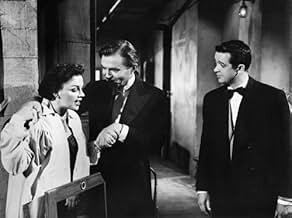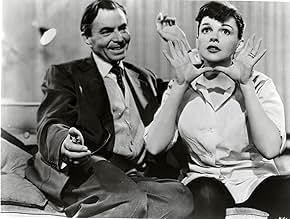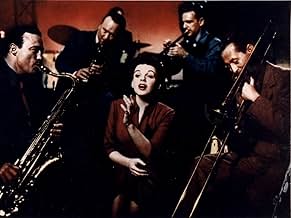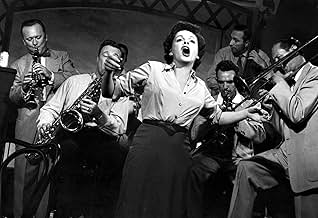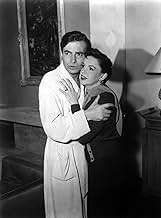CALIFICACIÓN DE IMDb
7.5/10
20 k
TU CALIFICACIÓN
Una estrella de cine ayuda a una joven cantante y actriz a encontrar la fama, a pesar de que su edad y el alcoholismo han hecho que su propia carrera esté hundiéndose en una espiral descende... Leer todoUna estrella de cine ayuda a una joven cantante y actriz a encontrar la fama, a pesar de que su edad y el alcoholismo han hecho que su propia carrera esté hundiéndose en una espiral descendente.Una estrella de cine ayuda a una joven cantante y actriz a encontrar la fama, a pesar de que su edad y el alcoholismo han hecho que su propia carrera esté hundiéndose en una espiral descendente.
- Nominado a 6 premios Óscar
- 7 premios ganados y 13 nominaciones en total
Tommy Noonan
- Danny McGuire
- (as Tom Noonan)
John Alban
- Academy Awards Attendee
- (sin créditos)
Laurindo Almeida
- Guitarist
- (sin créditos)
Leon Alton
- Usher
- (sin créditos)
Rudolph Anders
- Mr. Ettinger
- (sin créditos)
David Armstrong
- Soundman
- (sin créditos)
Phil Arnold
- Agent #3
- (sin créditos)
Nadine Ashdown
- Esther - Age 6
- (sin créditos)
Gertrude Astor
- Racetrack Spectator
- (sin créditos)
Argumento
¿Sabías que…?
- TriviaGeorge Cukor offered Marlon Brando the role of Norman Maine on the set of Julio César (1953). "Why would you come to me?" asked Brando. "I'm in the prime of my life... If you're looking around for some actor to play an alcoholic has-been, he's sitting right over there"- pointing at his costar James Mason, who got the part.
- ErroresAfter Vicki comes home and she performs in her house for Norman, the doorbell rings and he goes to the door to accept a package for Vicki. His hair is all mussed-up when he goes to the door, but after he closes it and the camera goes back to him, there isn't a hair out of place. Then he walks over to where Vicki is and his hair is all mussed-up again.
- Citas
[last lines]
Vicki Lester: Hello, everybody. This is Mrs. Norman Maine.
- Versiones alternativasContrary to popular belief, the film was not originally at 181 minutes, but rather 196 (3hrs. and 16mins.) at a post-premiere shown on August 8, 1954 in Huntington Park, California. After its second post-premiere - the very next day - two scenes of 15 minutes total were deleted; making the film run its original world debut length at 181 minutes. One was a number called "When My Sugar Walks Down the Street" that came after Judy's take of "I'll Get By" in the 'Born in the Trunk' sequence, the other was a scene where Garland and James Mason's characters (Vicki and Norman) were picnicking on the beach; production stills and promotional advertisements are the only thing left in existence of the footage. After its world premiere on September 29, 1954, 27 minutes was cut, bringing it down to a mediocre 154 time length. Those scenes were:
- 1) Esther quitting the band
- 2) The Trinidad Coconut Oil Shampoo
- 3) Esther working at a drive-in
- 4) Norman being driven away drunk in his car
- 5) Norman inquiring Esther's old landlady
- 6) Spotting Esther on the TV commercial
- 7) Tracking down Esther at her new boarding residence
- 8) Driving down the strip - Esther getting sick
- 9) "Here's What I'm Here For" musical number - Norman proposes
- 10) "Lose That Long Face" musical number - Vicki breaks down
- ConexionesFeatured in Film Night: Film Night Special: Forty Years in Hollywood (1970)
- Bandas sonorasGotta Have Me Go with You
(uncredited)
Music by Harold Arlen
Lyrics by Ira Gershwin
Performed by Judy Garland with Jack Harmon & Don McKay
Opinión destacada
This movie is not without its flaws, but overall, it is a masterpiece.
The quintessential story of a couple, one who's career is on the rise, the other on the decline- is made extraordinary by the performances.
Ester Blodgett, aka: Vicki Lester (Judy Garland) plays the unknown talent with pipes that would put an organ to shame. Her singing in this movie is definitely a HUGE reason to watch it- especially the show stopper, "The Man that got away." Ester meets, by chance & some help from the bottle, the cinematic icon, Norman Maine (James Mason.) Even though he's drunk, he is taken with her. Much later that night, he finds her at a club just "kickin' it" with the boys in the band. In what is probably the best 5 mins of music in the history of musicals- Judy lets it all out in "The Man that got away." Sincerely, I MYSELF, have never heard singing like that. So absolutely raw, almost uncontrolled and full-out and all heart that it always gives me goosebumps! And an unobserved Norman Maine comes out of the shadows to tell Ester that he TOO has never heard singing like that. He tells her, (completely sober after sleeping off a little) that she has a great talent. And he makes her believe it.
She eventually gets her chance with some help from Norman, and makes a big hit movie. She starts to make a lotta hit movies. Meanwhile, Norman gets cut from the studio by his longtime friend & boss, Oliver Niles. One thing leads to another & even though he is happily married now to Ester, his drinking starts up again. In a scene that is almost too awful to watch, he stumbles in on her acceptance speech at the Academy Awards. I dunno if that slap was real, but it looked real. And the ashamed look on his face afterwards looks real.
I won't give away the ending, but I will tell you why I liked this movie. First of all is Judy's singing. There are many memorable songs and moments. She always gives it her all when she sings. Or to paraphrase Ester in the movie, it's when she is her most alive. Her acting is terrific too. In a scene that is so well written and ahead of its time (and timeless), Ester tells her friend & studio head that she is worried about what's happening to her & Norman. That she hates him for the lies, for the promises to quit, and for failing. That she too feels like a failure. This scene encapsulates the ripple effect caused by alcoholism. Judy is absolutely mesmerizing as the wife who has discovered that love is not enough.
James Mason delivers one of the best & most convincing performances of an alcoholic on the decline that I've ever seen on screen. First of all, his charm & sincerity are apparent. When Libby (his Publicity Agent) says that his appeal & charm escape him, it's because he didn't see this side of him. He only saw the mean drunk and that wasn't who Norman Maine really was. James Mason is LOOKS so convincing that you'd swear he had a quick 6 or 7 drinks before the shoot. And his pain is real. In the scene where she gets him out of night court, his self-disgust and shame are vividly on his face. And the scene where he over-hears Ester & Oliver talking about him is enough to make anyone reach for the hankies. He has so much chemistry with Judy that you'd swear they were really in love. Many a reviewer has mentioned this- and I won't speculate on it- suffice to say that it adds tremendously to the movie, because it seems palpable how much Ester & Norman care about each other & are desperately in love. Definite Oscar-calibre performance by Garland & Mason here. This is the story of the Oscar that got away. In any world that was just, they both would've gotten one.
All the supporting roles are well done and not too obtrusive. My only complaint with the movie is the editing. I'm happy to have the restored version, but the editing could've made a more intense, compact version of the film. I will give one of many examples: The scene towards the end where her friend from the band arrives at her house to take her to the benefit. It is a very important scene. The next scene is at the benefit location. We have several minutes of them showing the backstage bustle before Ester & her friend enter. They already showed in the beginning of the film all the backstage confusion- it slows down the story. They could've cut directly to the part where she & him walk in. You still get a sense of what's going on around them without that long lead-in. That is just an example, there are more. But it is a minor complaint - I have a DVD & can scan when I need to. Overall this is a timeless movie with outstanding performances. A must see!!
The quintessential story of a couple, one who's career is on the rise, the other on the decline- is made extraordinary by the performances.
Ester Blodgett, aka: Vicki Lester (Judy Garland) plays the unknown talent with pipes that would put an organ to shame. Her singing in this movie is definitely a HUGE reason to watch it- especially the show stopper, "The Man that got away." Ester meets, by chance & some help from the bottle, the cinematic icon, Norman Maine (James Mason.) Even though he's drunk, he is taken with her. Much later that night, he finds her at a club just "kickin' it" with the boys in the band. In what is probably the best 5 mins of music in the history of musicals- Judy lets it all out in "The Man that got away." Sincerely, I MYSELF, have never heard singing like that. So absolutely raw, almost uncontrolled and full-out and all heart that it always gives me goosebumps! And an unobserved Norman Maine comes out of the shadows to tell Ester that he TOO has never heard singing like that. He tells her, (completely sober after sleeping off a little) that she has a great talent. And he makes her believe it.
She eventually gets her chance with some help from Norman, and makes a big hit movie. She starts to make a lotta hit movies. Meanwhile, Norman gets cut from the studio by his longtime friend & boss, Oliver Niles. One thing leads to another & even though he is happily married now to Ester, his drinking starts up again. In a scene that is almost too awful to watch, he stumbles in on her acceptance speech at the Academy Awards. I dunno if that slap was real, but it looked real. And the ashamed look on his face afterwards looks real.
I won't give away the ending, but I will tell you why I liked this movie. First of all is Judy's singing. There are many memorable songs and moments. She always gives it her all when she sings. Or to paraphrase Ester in the movie, it's when she is her most alive. Her acting is terrific too. In a scene that is so well written and ahead of its time (and timeless), Ester tells her friend & studio head that she is worried about what's happening to her & Norman. That she hates him for the lies, for the promises to quit, and for failing. That she too feels like a failure. This scene encapsulates the ripple effect caused by alcoholism. Judy is absolutely mesmerizing as the wife who has discovered that love is not enough.
James Mason delivers one of the best & most convincing performances of an alcoholic on the decline that I've ever seen on screen. First of all, his charm & sincerity are apparent. When Libby (his Publicity Agent) says that his appeal & charm escape him, it's because he didn't see this side of him. He only saw the mean drunk and that wasn't who Norman Maine really was. James Mason is LOOKS so convincing that you'd swear he had a quick 6 or 7 drinks before the shoot. And his pain is real. In the scene where she gets him out of night court, his self-disgust and shame are vividly on his face. And the scene where he over-hears Ester & Oliver talking about him is enough to make anyone reach for the hankies. He has so much chemistry with Judy that you'd swear they were really in love. Many a reviewer has mentioned this- and I won't speculate on it- suffice to say that it adds tremendously to the movie, because it seems palpable how much Ester & Norman care about each other & are desperately in love. Definite Oscar-calibre performance by Garland & Mason here. This is the story of the Oscar that got away. In any world that was just, they both would've gotten one.
All the supporting roles are well done and not too obtrusive. My only complaint with the movie is the editing. I'm happy to have the restored version, but the editing could've made a more intense, compact version of the film. I will give one of many examples: The scene towards the end where her friend from the band arrives at her house to take her to the benefit. It is a very important scene. The next scene is at the benefit location. We have several minutes of them showing the backstage bustle before Ester & her friend enter. They already showed in the beginning of the film all the backstage confusion- it slows down the story. They could've cut directly to the part where she & him walk in. You still get a sense of what's going on around them without that long lead-in. That is just an example, there are more. But it is a minor complaint - I have a DVD & can scan when I need to. Overall this is a timeless movie with outstanding performances. A must see!!
- rondine
- 25 ago 2002
- Enlace permanente
Selecciones populares
Inicia sesión para calificar y agrega a la lista de videos para obtener recomendaciones personalizadas
Detalles
- Fecha de lanzamiento
- País de origen
- Idioma
- También se conoce como
- A Star Is Born
- Locaciones de filmación
- Church of the Good Shepherd - 505 North Bedford Drive, Beverly Hills, California, Estados Unidos(Norman Maine's funeral)
- Productora
- Ver más créditos de la compañía en IMDbPro
Taquilla
- Presupuesto
- USD 5,019,770 (estimado)
- Total en EE. UU. y Canadá
- USD 4,335,968
- Total a nivel mundial
- USD 4,349,352
- Tiempo de ejecución2 horas 34 minutos
- Relación de aspecto
- 2.55 : 1
Contribuir a esta página
Sugiere una edición o agrega el contenido que falta

Principales brechas de datos
What is the Hindi language plot outline for Nace una estrella (1954)?
Responda







